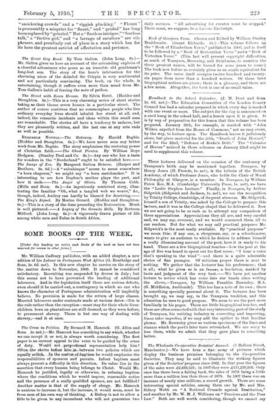Three lectures delivered on the occasion of the centenary of
Tennyson's birth may be mentioned together. Tennyson, by Henry Jones (H. Frowde, ls. net), is the tribute of the British Academy, of which Professor Jones, who holds the Chair of Moral Philosophy at Glasgow, is a member. In Tennyson, by William Paton Ker, M.A. (Cambridge University Press, is. net), we have the "Leslie Stephen Lecture." Finally, in Tennyson, by Arthur Sidgwick (Sidgwick and Jackson, ls. net), we see the recognition by Trinity College, Cambridge, of its great alumnus. Mr. Sidgwick, himself a son of Trinity, was asked by the College to prepare this lecture, and it was in the College chapel that he delivered it. Now we are not going to be so rash as to attempt any comparison of these appreciations. Appreciations they all are, and very careful and we may say, reverent, and we would commend them all to our readers. But for what we may call practical purposes Mr. Sidgwick's is the most easily available. By "practical purposes" we mean this: if any one, a clergyman, say, or a schoolmaster, wants to give an audience to which he desires to address himself a really illuminating account of the poet, here it is ready to his hand. There are a few biographical touches—how the poet at the age of five was heard to spout out his first verse : "I hear a voice that's speaking in the wind "—and there is a quite admirable choice of fine passages. Of criticism proper there is next to nothing. We gather that the lecturer has his preferences ; that is all; what he gives us is an tamest, a laudation, marked by taste and judgment of the very best.—We have yet another lecture to notice which has come into our hands since writing the above,—Tennyson, by William Franklin Rawnsley, M.A. (G. Middleton, .Ambleside). This too has a note of its own ; there is something specially personal about it. The lecturer has been brought up, we may say, in the Tennyson tradition, and this education he uses to good purpose. We seem to see the poet more familiarly in his pages. There are little biographical touches, and these are often connectedwith that very interesting part of the study of Tennyson, his untiring industry in correcting and improving, limes labor impro'bus, if we may add the epithet to that familiar phrase. Mr. Rawnsley gives us various specimens of the lines and stanzas which the poet's later taste retrenched. We are sorry to lose them, while we admit that they gave place to something better.










































 Previous page
Previous page